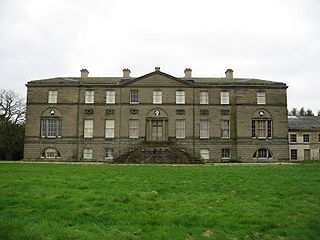Related Research Articles

Baron Kilmaine is a title that has been created twice, both times in the Peerage of Ireland. The first creation came in 1722 in favour of the soldier the Hon. James O'Hara. Two years later he succeeded his father as Baron Tyrawley. However, both titles became extinct on the second Baron Tyrawley's death in 1773 without legitimate sons.

Sir Frank Bowden, 1st Baronet, was a British businessman and inventor. He was a founder of the Raleigh Bicycle Company.

Colonel William Montagu, 5th Duke of Manchester, styled Viscount Mandeville until 1788, was a British peer, soldier, colonial administrator and politician. He was Governor of Jamaica from 1808 to 1827, and Manchester Parish was named after him.

The Broughton, later Broughton-Delves, later Broughton Baronetcy, of Broughton in the County of Stafford, is a title in the Baronetage of England. It was created on 10 March 1661 for Sir Brian Broughton, of Broughton Hall, near Eccleshall, Staffordshire, High Sheriff of Staffordshire from 1660 to 1661 and the member of an ancient Staffordshire family.
The Tuck Baronetcy, of Park Crescent in Metropolitan Borough of St Marylebone, is a title in the Baronetage of the United Kingdom. It was created on 19 July 1910 for Adolph Tuck. He was chairman and managing director of Raphael Tuck & Sons Ltd., makers of Christmas cards, picture postcards, et cetera. The Tuck family is of German-Jewish origin. The first Baronet's father Raphael Tuck was born in Prussia and emigrated to the United Kingdom in 1865.
Sir Thomas Charlton Meyrick, 1st Baronet, known as Thomas Charlton until 1858, was a Welsh Conservative Member of Parliament.
There have been two baronetcies created for persons with the surname Pakington, one in the Baronetage of England and one in the Baronetage of the United Kingdom. One creation is extant as of 2008.

Sir Andrew Agnew, 7th Baronet was a Scottish politician and a prominent promoter of Sunday Sabbatarianism, which brought him to the notice of Charles Dickens who criticised both his cause and his character.
Sir David Baird, 2nd Baronet, of Newbyth was a British baronet and captain in the British army.
Lieutenant-General Sir Alexander Campbell, 1st Baronet, was a senior officer of the British Army during the early nineteenth century. His long and varied career saw extensive action, including engagements in Europe during the American Revolutionary War, in India during the Fourth Anglo-Mysore War and subsequently in the Peninsular War as one of the Duke of Wellington's generals. Badly wounded during the Peninsular campaign, Campbell was rewarded with a knighthood and a baronetcy, later holding a number of prestigious military commands.
Dermod McMurrough O'Brien, 5th Baron Inchiquin was an Irish baron.
Sir Oliver St George, 1st Baronet was an Irish Member of Parliament.

Colonel John Cameron of Fassiefern (1771–1815) of Fassiefern, Inverness-shire, was a celebrated Scottish military commander of the Napoleonic wars. He was a cousin of the Camerons of Lochiel.
Sir Henry Piers 1st Baronet (1629–1691), of Tristernagh Abbey, County Westmeath, Ireland was an Anglo-Irish landowner, soldier, Member of Parliament, Sheriff of Counties Longford and Westmeath, Sheriff of St Johnstown, and an antiquarian.

Charlotte Lennox, Duchess of Richmond, was a British aristocrat and peeress best known as the hostess of the Duchess of Richmond's ball.
Colonel Archibald Macneil 5th laird of Colonsay, was a Scottish laird who served as an officer in the British Army during the Napoleonic Wars.
Colonel Sir Alexander Don, 5th Baronet of Newton Don was a Scottish soldier who served as a British Army officer during the French Revolutionary Wars.
Lieutenant-General James Webber Smith CB (1778–1853) was a British Royal Artillery officer who fought in the French Revolutionary Wars and Napoleonic Wars.
General John Alfred Street, CB was a British Army officer who was the 25th General Officer Commanding, Ceylon.
Colonel Henry Washington (1615–1664), was an officer in the Royalist army during the English Civil War.
References
- Lundy, Darryl (25 August 2011), "Lewis Mackenzie", Person Page, The Peerage, p. 50488 § 504877 Endnotes:
- Mosley, Charles, ed. (2003), Burke's Peerage, Baronetage & Knightage, vol. 2 (107th, 3 volumes ed.), Wilmington, Delaware, U.S.A.: Burke's Peerage (Genealogical Books), p. 2505
- Attribution
 This article incorporates text from this source, which is in the public domain :Browne, James (1854), history of the Highlands and of the Highland clans: with an extensive selection from the hitherto inedited Stuart papers, vol. 4, A. Fullarton and Co., pp. 368–384
This article incorporates text from this source, which is in the public domain :Browne, James (1854), history of the Highlands and of the Highland clans: with an extensive selection from the hitherto inedited Stuart papers, vol. 4, A. Fullarton and Co., pp. 368–384